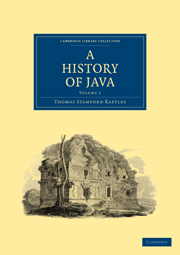Book contents
- Frontmatter
- Preface
- Preface
- Contents
- LIST OF PLATES IN VOLUME I
- Java first visited by the Portuguese
- CHAPTER I
- CHAPTER II
- CHAPTER III
- CHAPTER IV
- CHAPTER V
- CHAPTER VI
- CHAPTER VII
- CHAPTER VIII
- AN ANALYSIS OF THE BRÁTA YÚDHA, OR HOLY WAR, OR RATHER THE WAR OF WOE: AN EPIC POEM, IN THE KÁWI OR CLASSIC LANGUAGE OF JAVA
- Plate section
- Frontmatter
- Preface
- Preface
- Contents
- LIST OF PLATES IN VOLUME I
- Java first visited by the Portuguese
- CHAPTER I
- CHAPTER II
- CHAPTER III
- CHAPTER IV
- CHAPTER V
- CHAPTER VI
- CHAPTER VII
- CHAPTER VIII
- AN ANALYSIS OF THE BRÁTA YÚDHA, OR HOLY WAR, OR RATHER THE WAR OF WOE: AN EPIC POEM, IN THE KÁWI OR CLASSIC LANGUAGE OF JAVA
- Plate section
Summary
Having, in the foregoing pages, attempted to introduce the inhabitants of Java to the reader, by an account of their person, their manners, and employment in the principal departments of agriculture, manufactures, and commerce, I shall now endeavour to make him, in some degree, acquainted with their intellectual and moral character, their institutions, government, and such other particulars as may contribute to enable him to form some estimate of their relative rank in the scale of civilized society.
Intellectual character
From what has been stated of their progress in the manufacturing and agricultural arts, their general advancement in knowledge may be easily estimated. There are no establishments for teaching the sciences, and there is little spirit of scientific research among them. The common people have little leisure or inclination for improving their minds or acquiring information, but they are far from being deficient in natural sagacity or docility. Their organs are acute and delicate, their observation is ready, and their judgment of character is generally correct. Like most eastern nations, they are enthusiastic admirers of poetry, and possess a delicate ear for music. Though deficient in energy, and excited to action with difficulty, the effect probably of an enervating climate and a still more enervating government, they are capable of great occasional exertion, and sometimes display a remarkable perseverance in surmounting obstacles or enduring labours.
- Type
- Chapter
- Information
- A History of Java , pp. 244 - 307Publisher: Cambridge University PressPrint publication year: 2010First published in: 1817



